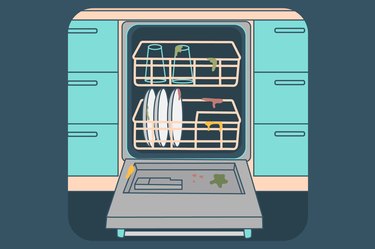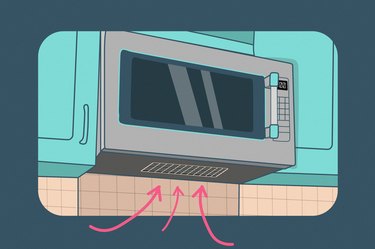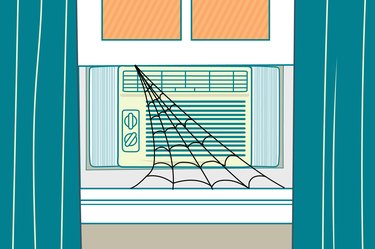
Be honest: When's the last time you gave your dishwasher a comprehensive cleaning? Last month, last year...never?
We get it — cleaning your dishwasher sounds counterintuitive. After all, the water and soap sanitizing your plates probably disinfects your dishwasher too, right? Well, not quite.
Video of the Day
Video of the Day
Turns out that food can clog your machine, making it a breeding ground for meddling microorganisms. These bad bugs can hitch a ride on your "clean" dinnerware and unintentionally become part of your meal. Gross.
Here, we spoke to Kelly Reynolds, PhD, director of the Environment, Exposure Science and Risk Assessment Center at the University of Arizona, to get the dirt on whether a dirty dishwasher can harm your health (plus tips on how and when to clean it).
What Germs Are Lurking in a Dirty Dishwasher?
"Like most moist environments in the home, dishwashers can harbor a wide range of bacteria, such as E. coli, Acinetobacter, Pseudomonas, Enterobacter and Legionella," Reynolds says.
"Candida [a type of fungus] have also been isolated from dishwasher environments, including drains and rubber seals," Reynolds adds.
And when your drain gets backed up, it's bad news. Not only does the gunk reduce the efficiency of your machine, but "clogged dishwasher drains can also create an atmosphere for these organisms and their biofilms to grow," Reynolds says.
Tip
Can These Germs Make You Sick?
Possibly, if you have a weakened immune system.
"Most of the germs found in dishwashers do not cause illness in healthy populations, but immunocompromised persons are at an increased risk when exposed," Reynolds says.
So, what kind of possible infections can you get from your dirty dishwasher? "In susceptible populations, health effects may involve cold- and flu-like symptoms," including vomiting and diarrhea, Reynolds says.
For example, if your dishwasher is teeming with E. coli, it can potentially contaminate the water used to wash your dishes. So, when you pull a plate from your appliance, these pesky pathogens might be present. Problem is, you can become infected with E. coli if you accidentally swallow that contaminated water, according to the University of Michigan Health.
The most common signs of an E. coli infection include bloody diarrhea, stomach cramps, nausea and vomiting, but some strains may also produce severe anemia or kidney failure, per the University of Michigan Health.
Warning
Most cases of an E. Coli infection clear up on their own in about a week, per the University of Michigan Health. But if you start to show symptoms like pale skin, bruising or passing only small amounts of urine, this could be a sign the infection is affecting your blood or kidneys, and you need to see a doctor ASAP.
How Often Should You Clean Your Dishwasher?
Even if you're in great health, it's still a good idea to clean your dishwasher now and then to banish all the bacteria, fungi and funky odors and keep it functioning at peak performance.
So, how often should scrub your appliance? It "depends on your frequency of use, how dirty your dishwasher is and the quality of your source water," Reynolds says. "But a good general guideline is to clean monthly to reduce the buildup of germs, food, soap scum and hard water deposits."
How to Clean Your Dishwasher
Here are Reynold's tips for how to clean your dishwasher to keep bad bugs at bay:
1. Always follow the manufacturer's instructions. For instance, you may want to avoid using bleach, harsh chemicals or any abrasive materials that may damage the dishwasher.
2. Clear out the drain, food trap or filter on a weekly basis. Getting rid of residue and food particles will prevent a buildup of bacteria and mold.
3. Sanitize and deodorize once a month. "Some machines have a cleaning and sanitizing cycle built in," Reynolds says.
"Adding one to two cups of vinegar to the empty machine during the wash cycle is one way to eliminate deposits, and sprinkling in a cup of baking soda during a rinse cycle can help to deodorize the machine," she says.
So, How Bad Is It Really to Never Clean Your Dishwasher?
Ick factor aside, a dirty dishwasher probably won't be detrimental to your health as long as you have a strong immune system. But for people who are more susceptible to getting sick, keeping a microbe-free machine may be an important way to reduce your exposure risk to potentially harmful pathogens.
For most folks, a monthly sanitizing schedule is a smart strategy, if for nothing else, to keep your dishwasher running properly and to help you curb the possibility of disease-causing organisms.
Was this article helpful?
150 Characters Max
0/150
Thank you for sharing!
Thank you for your feedback!
Is this an emergency? If you are experiencing serious medical symptoms, please see the National Library of Medicine’s list of signs you need emergency medical attention or call 911.



